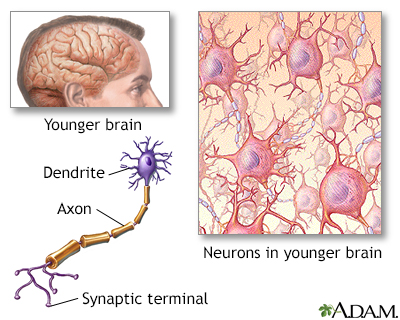Pregnancy SmartSiteTM
Chronic brain impairment - metabolic; Mild cognitive impairment - metabolic; MCI - metabolic; Neurocognitive disorder - metabolic DefinitionDementia is loss of brain function that occurs with certain diseases. Dementia may also be referred to as major neurocognitive disorder. Dementia due to metabolic causes is a loss of brain function that can occur with abnormal chemical processes in the body. With some of these disorders, if treated early, brain dysfunction can be reversed. Left untreated, permanent brain damage, such as dementia, can occur. CausesPossible metabolic causes of dementia include:
SymptomsMetabolic disorders may cause confusion and changes in thinking or reasoning. These changes may be short-term or lasting. Dementia occurs when the symptoms are not reversible. Symptoms can be different for everyone. They depend on the health condition causing the dementia. The early symptoms of dementia can include:
As the dementia gets worse, symptoms are more obvious and interfere with the ability to take care of yourself:
The person may also have symptoms from the disorder that caused dementia. Exams and TestsDepending on the cause, a nervous system (neurologic) examination is done to identify the problems. Tests to diagnose a medical condition causing the dementia may include:
To check for certain brain disorders, an electroencephalogram (EEG), head CT scan, or head MRI scan is usually done. TreatmentThe aim of treatment is to manage and correct the underlying disorder and control symptoms. With some metabolic disorders, treatment may stop or even reverse the dementia symptoms. Medicines used to treat Alzheimer disease have not been shown to work for these types of disorders. Sometimes, these medicines are used anyway, when other treatments fail to control the underlying problems. Plans should also be made for home care for people with dementia. Outlook (Prognosis)Outcome varies, depending on the cause of the dementia and the amount of damage to the brain. Possible ComplicationsComplications may include the following:
When to Contact a Medical ProfessionalContact your health care provider if symptoms get worse or continue. Go to the emergency room or call 911 or the local emergency number if there is a sudden change in mental status or a life-threatening emergency. PreventionTreating the underlying cause may reduce the risk for metabolic dementia. ReferencesBudson AE, Solomon PR. Other disorders that cause memory loss or dementia. In: Budson AE, Solomon PR, eds. Memory Loss, Alzheimer's Disease, and Dementia. 3rd ed. Philadelphia, PA: Elsevier; 2022:chap 17. Knopman DS. Cognitive impairment and dementia. In: Goldman L, Cooney KA, eds. Goldman-Cecil Medicine. 27th ed. Philadelphia, PA: Elsevier; 2024:chap 371. Paulsen JS, Gehl C. Neuropsychology. In: Jankovic J, Mazziotta JC, Pomeroy SL, Newman NJ, eds. Bradley and Daroff's Neurology in Clinical Practice. 8th ed. Philadelphia, PA: Elsevier; 2022:chap 44. Peterson R, Graff-Radford J. Alzheimer disease and other dementias. In: Jankovic J, Mazziotta JC, Pomeroy SL, Newman NJ, eds. Bradley and Daroff's Neurology in Clinical Practice. 8th ed. Philadelphia, PA: Elsevier; 2022:chap 95. | |
| |
Review Date: 3/31/2024 Reviewed By: Joseph V. Campellone, MD, Department of Neurology, Cooper Medical School at Rowan University, Camden, NJ. Review provided by VeriMed Healthcare Network. Also reviewed by David C. Dugdale, MD, Medical Director, Brenda Conaway, Editorial Director, and the A.D.A.M. Editorial team. The information provided herein should not be used during any medical emergency or for the diagnosis or treatment of any medical condition. A licensed medical professional should be consulted for diagnosis and treatment of any and all medical conditions. Links to other sites are provided for information only -- they do not constitute endorsements of those other sites. No warranty of any kind, either expressed or implied, is made as to the accuracy, reliability, timeliness, or correctness of any translations made by a third-party service of the information provided herein into any other language. © 1997- A.D.A.M., a business unit of Ebix, Inc. Any duplication or distribution of the information contained herein is strictly prohibited. | |

 Brain
Brain Brain and nervous ...
Brain and nervous ...
